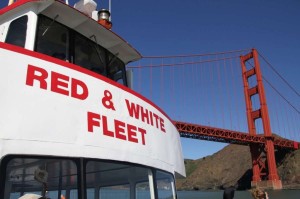
The high-speed hydrogen fuel cell ferry boat is set to hit the waters of the San Francisco Bay Area.
Image: Green Car Reports
Diesel burning vehicles in the U.S. alone emit pollutants that lead to 21,000 premature deaths each year and act as one of the largest drivers of climate change. The traditional ferry typically burns around one million liters of diesel fuel each year—producing 570 tons of carbon dioxide. In order to help combat this issue, Sandia National Laboratories and the Red and White Fleet ferry company are joining forces to create the first hydrogen fuel cell ferry boat to hit the waters of the San Francisco Bay Area.
Currently in the early stages of development, the boat is set to be named SF BREEZE—an acronym for “San Francisco Bay Renewable Energy Electric vessel with Zero Emissions.” As far as consumption goes, the researchers believe it will take about 1,000 kilograms (2,204 pounds) of hydrogen per day to power the ship.
ICYMI: Listen to Subhash Singhal, a world-leader in the study of fuel cells, talk about the future of energy and climate change.
To satisfy this demand, the construction of the world’s largest hydrogen fueling station will begin off shore and will have the ability to service both sea and land vehicles.
But this isn’t Siemens first take on zero emission ferries. Earlier this year, the lab developed the technology for the world’s first electrically-powered ferry in Norway. This ship has already hit the water successfully, causing no carbon dioxide emissions.
PS: We’re currently accepting abstracts for the 229th ECS Meeting in San Diego! Submit today!

